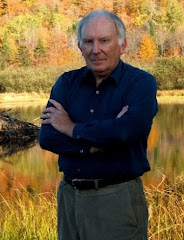Writers have always been the great "observers" of society, using examples from their surroundings to put forth ideas. Much like the soundtrack to a movie, authors use the seasons and light as metaphors to underscore events. For example, Mosher's narrator, James Kinneson, begins Stranger in the Kingdom in the early spring of 1952 when he was thirteen, and the story unfolds throughout that summer into the late fall, ending on Election Day. Noting our agrarian history, Jimmy follows a similar path from innocence to greater awareness during The Affair. As the days' sunlight grows, so too does his understanding of The Kingdom and his place in it. Reverend Andrews' "fall" appropriately takes place when the leaves turn and drop from the trees. Even the onset of snow, not only upon Andrews' departure but also during Nat's brief visit some thirty years later, places a final covering over the plot's events and brings the novel full circle.
During many class discussions of these literary devices, students ask whether authors intend for readers to notice, acknowledge, or even appreciate such offerings. My response tends to be the same each year: "If it seems right, it probably is."
Subscribe to:
Post Comments (Atom)

4 comments:
I think understanding the background themes really adds to the appreciation for the book. Not only do the events in the book reflect the seasons but the seasons also reflect universal feelings that span cultural and national boundaries.
At least, I think the do. . . .
I just wrote one and it got deleted so I will rewrite a synapsis-
I feel that authors use season and light to reflect the mood of the story and if a reader looks closely, they may be able to identify the authors tone in how the author expresses the mood. Is a person watching it storm after the enter their warm house or does it begin to pour after the child gets off the bus for the three block walk home? However, an author has to be careful not use weather too much or the story won't be plausible. If it rained every time Jimmy was sad, people would ask the author for God's phone number.
Keeping this in mind, it may be more interesting to observe where the author chooses not to mention seasons and light then where he or she does mention them. If the author tells you what to feel in one situation, what happens if he or she doesn't give a hint at the mood? Where do you look for more information? Above all, why?
Looking back to Mr. Mundahl's comment, I would say the reason that authors choose to use seasons as a underlying theme is to offer metaphors for situations that would be too hard to explain with words. The reason that this weather is felt by all readers from any country is because every reader can relate to it. If one writes metaphors about movies, alludes to books, or pairs a love problem to an apple and an orange, people who have not related to these objects in their lives won't understand the literary device. It will be wasted words. Weather, on the otherhand, will be understood by all readers (except for maybe snow). Seasons and light, sounds and nature, all can be used in millions of ways to express feelings and ideas that would be too hard to say with words but still can be understood by all.
While I have yet to look in the book for examples, I hope that our comments will be supported by the following reads as I look for nature.
I'm curious about how people from other parts of the US and the world see meaning in seasons.
Anyone?
I just finished reading the book and it was really good!!!!! The beginning was slow but when you hit the climax it really picked up and I couldn't put it down! I can't wait to listen to Mosher at Convocation. Now I am off to do my college applications! Yippee!! lol I am almost done though. I hope everyone is having a wonderful Summer and its only a little over a month till school! Can you believe already 2 months has passed since the end? Have a great rest of the summer and see you all in September! OMG Senior year here we come!!!
Morgan D.
Post a Comment